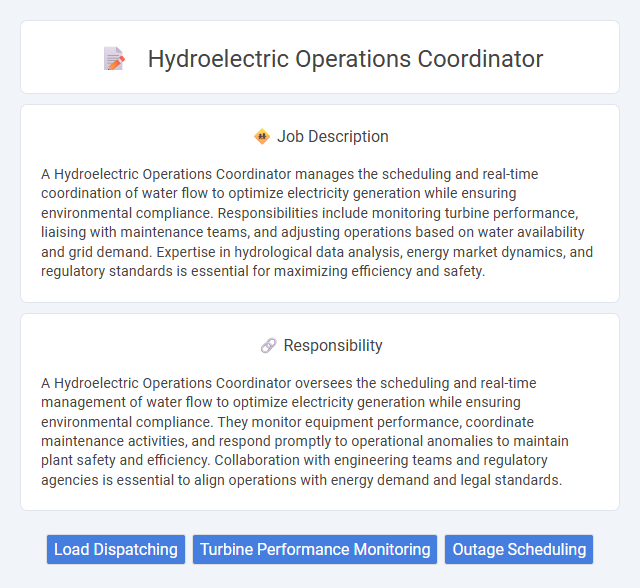
A Hydroelectric Operations Coordinator manages the scheduling and real-time coordination of water flow to optimize electricity generation while ensuring environmental compliance. Responsibilities include monitoring turbine performance, liaising with maintenance teams, and adjusting operations based on water availability and grid demand. Expertise in hydrological data analysis, energy market dynamics, and regulatory standards is essential for maximizing efficiency and safety.
Individuals who possess strong analytical skills, attention to detail, and the ability to work in high-pressure environments are likely suitable for a Hydroelectric Operations Coordinator role. Physical stamina may be necessary due to on-site inspections and irregular work hours, which might not be ideal for those with mobility issues or a preference for strictly office-based tasks. Candidates who are comfortable collaborating with technical teams and adapting to dynamic operational conditions could find this job fulfilling and manageable.
Qualification
A Hydroelectric Operations Coordinator typically requires a bachelor's degree in engineering, environmental science, or a related field combined with experience in hydroelectric plant operations. Proficiency in SCADA systems, knowledge of federal and state water regulations, and strong analytical skills are essential for managing turbine performance and optimizing energy production. Certification in project management or safety standards such as OSHA is often preferred to ensure compliance and operational efficiency.
Responsibility
A Hydroelectric Operations Coordinator oversees the scheduling and real-time management of water flow to optimize electricity generation while ensuring environmental compliance. They monitor equipment performance, coordinate maintenance activities, and respond promptly to operational anomalies to maintain plant safety and efficiency. Collaboration with engineering teams and regulatory agencies is essential to align operations with energy demand and legal standards.
Benefit
Hydroelectric operations coordinator roles likely offer benefits such as competitive salaries, comprehensive health coverage, and retirement plans. Employees may also gain access to professional development programs and opportunities for career advancement within the energy sector. Flexible scheduling and a focus on safety protocols could enhance overall job satisfaction and work-life balance.
Challenge
The role of a hydroelectric operations coordinator likely involves managing complex systems to ensure efficient energy production while navigating unpredictable environmental factors. Coordinators may face challenges related to balancing water resource management with regulatory compliance and maintaining grid stability. Demand for real-time decision-making and crisis response could add pressure, requiring strong analytical and problem-solving skills.
Career Advancement
Hydroelectric operations coordinators play a crucial role in managing and optimizing the performance of hydroelectric power plants, ensuring efficient energy production and grid reliability. Career advancement opportunities often lead to senior operations management, project leadership, or specialized roles in renewable energy strategy and environmental compliance. Developing expertise in real-time system monitoring, regulatory standards, and advanced control technologies significantly enhances prospects for promotion within the energy sector.
Key Terms
Load Dispatching
Hydroelectric operations coordinators specialize in load dispatching to efficiently manage water flow and electricity generation, ensuring grid stability and optimal power output. They monitor real-time data from turbines and reservoirs, adjusting operations to match demand and prevent outages. Expertise in SCADA systems and energy management software is critical for coordinating with control centers and maintaining compliance with regulatory standards.
Turbine Performance Monitoring
Hydroelectric operations coordinators specialize in turbine performance monitoring to maintain optimal energy output and efficiency. They analyze real-time data from turbine sensors, detecting anomalies and scheduling maintenance to prevent operational disruptions. Expertise in SCADA systems and data analytics ensures turbine longevity and maximized hydropower generation.
Outage Scheduling
Hydroelectric operations coordinators specializing in outage scheduling manage planned maintenance and emergency repairs to ensure optimal turbine performance and grid reliability. They coordinate with engineering teams, regulatory bodies, and grid operators to minimize downtime while adhering to safety and environmental regulations. Effective outage scheduling maximizes energy production efficiency and prevents costly operational disruptions.
 kuljobs.com
kuljobs.com